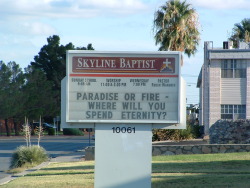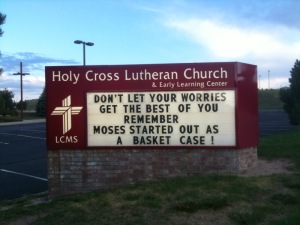Accountability In The Pew?
Whatever the Lord has given you, give it back!
*Go Back to Part I and read the series.
 What is required of a believer who graces the pew or chair weekly during the Sunday morning service? Usually not much, because, I feel, that the church does not allow you to give back anything except your tithe or offering unless you are gifted musically or part of the staff helping with the service. The worship leader or choir director leads the music, the pastor or member of the staff preaches the sermon while Joe Christian just sits in his pew and follows. In some churches they even supply road maps called church bulletins to make it even easer for the dumb sheep to follow their shepherds.
What is required of a believer who graces the pew or chair weekly during the Sunday morning service? Usually not much, because, I feel, that the church does not allow you to give back anything except your tithe or offering unless you are gifted musically or part of the staff helping with the service. The worship leader or choir director leads the music, the pastor or member of the staff preaches the sermon while Joe Christian just sits in his pew and follows. In some churches they even supply road maps called church bulletins to make it even easer for the dumb sheep to follow their shepherds.
After church the staff discusses why there seems to be no life in the service, blaming those in the congregation for lack of participation. The pastor wonders why not one responds to this preaching. Well, maybe it is because the congregation did not come prepared to respond, nor allowed to respond if even given a chance.
Maybe as a church we need to nurture a different mindset that allows the congregation to prepare for Sunday Services rather than the staff prepare Sunday Services for the congregation. If a church has a vibrant private prayer and worship life through its individual members, then we need to allow for a corporate expression allowing them to give back what the Lord has individually given them during the week: a scripture, a testimony, a teaching, a new song, a poem, a painting, or even a dance.

 The church where I grew up at one time allowed no instruments in the sanctuary. When they built a new sanctuary, they got a piano and organ, but no other form was allowed. Youth with drums, electric guitars, moog synthesizers were not allowed to share their musical talents. If I would have remained in that environment, both of my sons would have not been permitted to give their musical talents back to the Lord (drums and bass) in the sanctuary. How sad, and the church wonders why their youth go to secular music? It is because there they are allowed to express their musical talents.
The church where I grew up at one time allowed no instruments in the sanctuary. When they built a new sanctuary, they got a piano and organ, but no other form was allowed. Youth with drums, electric guitars, moog synthesizers were not allowed to share their musical talents. If I would have remained in that environment, both of my sons would have not been permitted to give their musical talents back to the Lord (drums and bass) in the sanctuary. How sad, and the church wonders why their youth go to secular music? It is because there they are allowed to express their musical talents.
What would happen if we just allowed the worshipers in our congregation to worship, actually allow them to express their forms of talents by giving them back to the Lord. I think we just might see life.




 5
5







